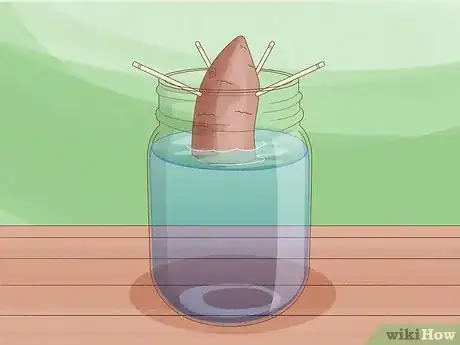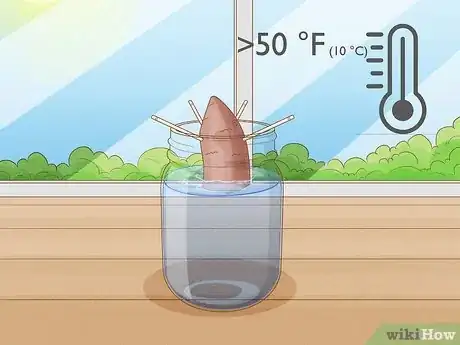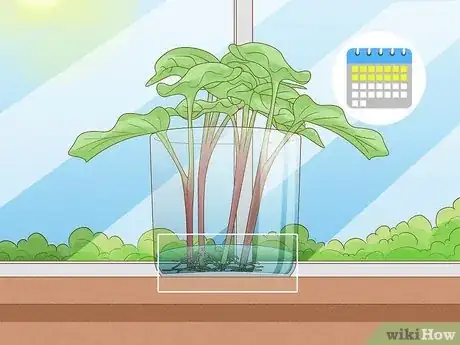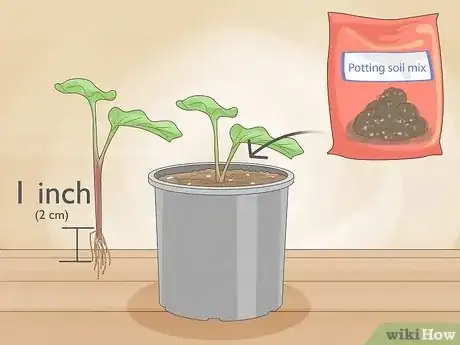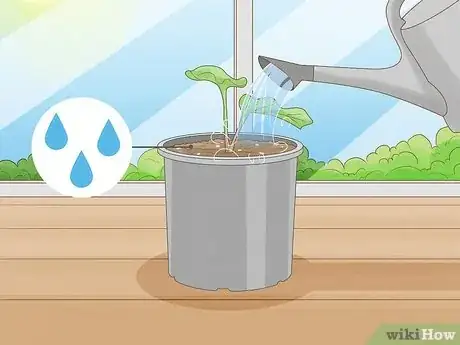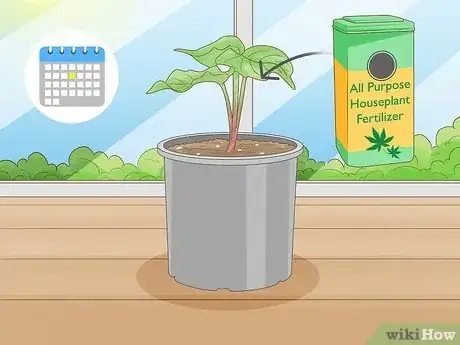This article was co-authored by wikiHow staff writer, Devin McSween. Devin McSween is a wikiHow Staff Writer. With a background in psychology, she has presented her research in social psychology at a variety of conferences and has contributed to several manuscripts for publication. At wikiHow, Devin combines her love of writing and research with the goal of bringing accessible information to wikiHow readers that will help them learn and grow. She earned her BS in Psychology from the College of Charleston.
There are 14 references cited in this article, which can be found at the bottom of the page.
This article has been viewed 5,154 times.
Learn more...
Sweet potato vines are known for their delicious tubers and beautiful, trailing vines that make a lovely addition to your indoor plant collection. The best part about these plants is that they are easy to grow and take care of! Our steps below will teach you how to grow a sweet potato vine from a sweet potato, how to care for your new houseplant, and give you ideas on how to display it in your home.
Things You Should Know
- Put an organic, untreated sweet potato in a glass of water to grow slips. Remove the slips when they are 6 inches (15 cm) tall.
- Place the slips in a glass of water to root and plant them in a pot once the roots are about 1 inch (2 cm) long.
- Set your sweet potato houseplant near a sunny window where it can hang or grow on a trellis.
Steps
Sprouting Slips from Your Sweet Potato
-
1Buy an organic, untreated sweet potato. Sweet potato vines are grown from slips, which are the stems that grow from a mature sweet potato. Most of the sweet potatoes you find in a store are treated with chemicals that prevent slips from growing, so look for organic, untreated sweet potatoes at your local farmer’s market.[1]
- You can also ask if any of your friends or neighbors have a sweet potato they can spare from their garden.
-
2Put your sweet potato in a jar or glass of water. Your sweet potato needs lots of water in order to grow slips. Suspend your potato in a glass of water by poking 4 toothpicks around its middle. Then, balance the exposed toothpicks over the edge of your jar or glass so that the top half of the potato sticks out of the container.[2]
- If you can find a perfectly snug jar or glass, you don’t have to use toothpicks. Just wedge the potato inside, making sure that the bottom half stays submerged while the top half sticks out of the jar.[3]
Advertisement -
3Set your sweet potato in front of a sunny window. Choose a window where your slips will get a lot of warm light and where you can watch them grow. Make sure the temperature doesn’t drop below 50 °F (10 °C) to ensure that lots of healthy slips grow.[4]
- Replace the jar with fresh water every 2 to 3 days.[5]
- If you are growing slips during the colder months, or if the temperature drops, you can use a grow light or heat mat to keep your slips warm.[6]
-
4Watch as the slips grow over the next 3 to 4 weeks. Several slips will begin to grow out of the top of your sweet potato in about 2 weeks. You will see the slips start to grow taller and sprout tiny, green leaves.[7]
-
5Harvest the slips once they’re about 6 inches (15 cm) tall. Gently twist at the base of each slip to remove it from the potato. Then, pull off most of the leaves on the stem, leaving only the 2 to 3 leaves at the very top.[8]
- Growing slips from a sweet potato can be tricky, so don’t be discouraged if you only have a few, straggly slips sprouting, or none at all. If your slips aren’t growing tall and lush, the best thing to do is grab another potato – or a couple – and start the process again.[9]
- If you have the opposite problem and have too many slips on your hands, they make great gifts for your friends and family!
Planting Your Slips
-
1Place your slips in a small jar or glass of water. First, add about 1 inch (2 cm) of water to the glass – you want to see just the bottom of the stem submerged. Then, set the slips in front of a sunny window to keep them warm. This encourages root growth and gives you a nice view of your plant’s progress![10]
-
2Monitor the slips for roots. Your slips will start growing roots after about 1 to 2 weeks. Not all slips will grow roots, so remove any that aren’t producing roots after a couple of weeks. Be sure to give your slips nice clean water by refreshing their jars every 2 to 3 days or when it starts to become cloudy.[11]
-
3Plant the slips in a pot once the roots are about 1 inch (2 cm) long. Fill a small nursery pot with a drainage hole with a well draining potting mix. Poke a hole into the soil and gently place the slip inside, leaving just the leaves exposed. Then give the slips a nice, good soak.[12]
- You can also choose to grow your vine in the jar of water. All you have to do is change the water every couple of days to prevent it from becoming cloudy. When your sweet potato plant’s roots begin to fill up the bottom of its container, simply put it into a larger jar.[13]
Caring for Your Sweet Potato Houseplant
-
1Place the baby sweet potato plants near a sunny window to grow. Find a place where your sweet potato plant will get about 6 hours of direct light each day. Sweet potatoes also love warm weather, so make sure the area you choose stays about 65-70 °F (18-21 °C).[14]
- Place a grow light 1 foot (30 cm) over your sweet potato plant if you do not have a warm, sunny area in your home.[15]
-
2Water your plant regularly so that the soil stays slightly moist. Sweet potatoes are considered drought tolerant, but thrive the best when they receive consistent watering. Let the top inch of soil dry out before each watering so your plant does not become waterlogged.[16]
-
3Fertilize your plant sparingly. Sweet potato plants will grow rapidly and healthily without fertilizer. However, you can encourage more growth with a multipurpose, houseplant fertilizer. Fertilize your sweet potato plant once a month and water it after so that the fertilizer disperses into the roots.[17]
-
4Regularly prune your sweet potato plant to stimulate growth. As you check on your plant’s growth, remove any dead and dying leaves that you see. It’s also a good idea to snip off any leggy, sparse vines to encourage a full, bushy plant. If you find that your vines are getting too long and unwieldy for your home, you can simply cut them off![18]
-
5Repot your sweet potato plant when it starts to crowd its pot. While sweet potato plants are fast growers, they typically only need to be repotted every few years. However, you may find that your plant needs to be repotted earlier if it is rootbound. This is when the plant’s roots can no longer spread out in its pot and instead clump together, often taking the shape of the pot.[19]
- Regularly check your plant to see if it is getting crowded in its pot.
-
6Propagate new sweet potato plants with vine cuttings. First, cut a healthy vine about 6-12 inches (15-30 cm) long and remove the leaves from the bottom ⅔ of the vine. Place the vine in a glass of water where it will receive indirect sun. Pot the cutting once the cutting has grown roots about 3 inches (7 cm) long for a new, baby sweet potato plant![20]
Displaying Your Sweet Potato Houseplant
-
1Hang your sweet potato plant in a basket to trail. Sweet potato plants are vining plants and grow beautifully when trailing down from a high place. You can make your own macrame plant hanger and set it in the corner of your living room for a boho, jungle vibe. Or you can simply let its vines cascade down from a tall windowsill or plant stand.[21]
-
2Create a support that your vines will climb up. Sweet potato vines also grow beautifully vertically, though they need guidance to grow upwards. Use an indoor trellis that stakes directly into the pot and gently wrap the vines around and through each opening. You can also wrap the vines around a ladder bookcase or up the sides of a plant stand.[22]
-
3Surround your sweet potato plant with other houseplants. Play with different leaf textures by adding your vining sweet potato with a squat cactus or tall, pointed snake plant. Arrange your plants in odd numbers like 3, 5, and 7 for a dynamic and interesting display![23]
Things You’ll Need
Sprouting Slips from Your Sweet Potato
- Organic, untreated sweet potato
- Jar or glass
- Toothpicks
- Grow light, optional
- Heat mat, optional
Planting Your Slips
- Small jar or glass
- Small nursery pot
- Well draining potting mix
Caring for Your Sweet Potato Houseplant
- Grow light, optional
- Multipurpose, houseplant fertilizer
- Scissors
- Jar or glass
Displaying Your Sweet Potato Houseplant
- Macrame plant hanger
- Indoor trellis
- Plant stand
- Large pot
References
- ↑ https://practicalselfreliance.com/sweet-potato-slips/
- ↑ https://hgic.clemson.edu/factsheet/sweet-potato/
- ↑ https://www.bobvila.com/articles/how-to-grow-sweet-potatoes/
- ↑ <https://www.allaboutgardening.com/sweet-potato/
- ↑ https://www.plantindex.com/grow-sweet-potato-containers/
- ↑ https://www.allaboutgardening.com/sweet-potato/
- ↑ https://hgic.clemson.edu/factsheet/sweet-potato/
- ↑ https://hgic.clemson.edu/factsheet/sweet-potato/
- ↑ https://houseplantcentral.com/grow-sweet-potato/
- ↑ https://practicalselfreliance.com/sweet-potato-slips/
- ↑ https://hgic.clemson.edu/factsheet/sweet-potato/
- ↑ https://www.17apart.com/2012/04/sack-o-potatoes-planting-sweet-potatoes.html
- ↑ https://oldworldgardenfarms.com/2021/02/18/grow-sweet-potato-slips/
- ↑ https://gardenbetheteacher.com/easy-steps-to-grow-sweet-potato-vine-indoors-hanging-basket/
- ↑ https://plantcaretoday.com/ornamental-sweet-potato-vine-care.html
- ↑ http://extension.msstate.edu/publications/growing-sweet-potatoes-home
- ↑ https://plantcaretoday.com/ornamental-sweet-potato-vine-care.html
- ↑ https://plantcaretoday.com/ornamental-sweet-potato-vine-care.html
- ↑ https://plantcaretoday.com/ornamental-sweet-potato-vine-care.html
- ↑ https://getbusygardening.com/propagating-sweet-potato-vine/
- ↑ https://gardenbetheteacher.com/easy-steps-to-grow-sweet-potato-vine-indoors-hanging-basket/
- ↑ https://www.gardeningknowhow.com/edible/vegetables/sweet-potato/growing-sweet-potatoes-vertically.htm#:~:text=A%20trellis%20can%20also%20be,trellis%20is%20essential%20for%20success.
- ↑ https://www.homesandgardens.com/interior-design/decorating-with-plants
- ↑ https://www.plantindex.com/grow-sweet-potato-containers/
- ↑ https://www.bobvila.com/articles/how-to-grow-sweet-potatoes/

